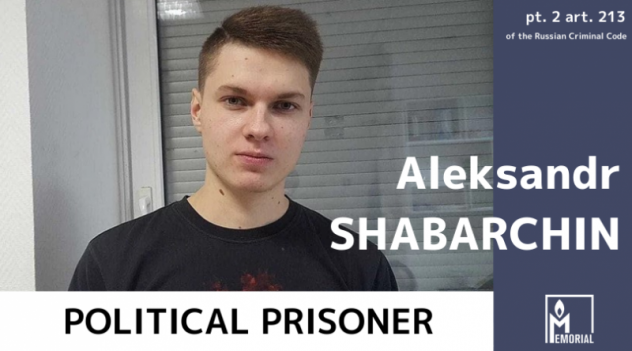Defendant in Perm ‘Putin mannequin’ case is a political prisoner, Memorial says
We demand the immediate release of Aleksandr Shabarchin, sentenced to two years in a penal colony, and the quashing of the convictions in the case, one other victim of which has been Danila Vasilyev who was given a suspended sentence.
Memorial Human Rights Centre considers Aleksandr Shabarchin, an opposition activist from Perm convicted in the case of the 'Putin mannequin,' a political prisoner. We consider Danila Vasilyev, also convicted in the same case, a victim of politically motivated prosecution. We believe that Shabarchin and Vasilyev committed no crime and have been prosecuted because of their political activism. Memorial Human Rights Centre calls for the immediate release of Aleksandr Shabarchin from custody and the quashing of the convictions of both activists.
The charges against Aleksandr Shabarchin and Danila Vasilyev
On 11 November 2018 at a central intersection in Perm two young men tied a mannequin in prison clothing to a lamppost. The mannequin wore a paper mask of Vladimir Putin and a placard on its chest with the words: ‘Liar, war criminal Pynya V.V.’ After that, for an hour they and a third defendant in the case, Aleksandr Etkin (later acquitted by the court for lack of evidence), watched the reactions of passers-by, taking pictures of what was happening on their phones.
A week later, Aleksandr Shabarchin published on the satirical YouTube channel Perm Thunderstorm a video clip called ‘Special Forces detained Putin.’ The video was preceded by the words: ‘This video is staged, and the people in it are actors. The purpose of the video is not to humiliate or offend anyone. It is created purely for entertainment. All coincidences with real people are accidental. P. S. Do not put us in jail, please.’
The video was created from several episodes shot at different times and locations: the staged ‘detention of the terrorist Pynya’ (an actor wearing a paper mask reminiscent of Putin) in a cafe where he tries to collect taxes from visitors; the ‘interrogation’ of the detainee by ‘special forces’ on a stretch of wasteland; and the episode with which they have been charged in which the mannequin is tied to a lamppost and the reactions of passers-by are observed (before this, it had been explained that it had not been possible to deliver the criminal Pynya to The Hague).
How the case developed
It did not prove possible to find evidence of a crime in the satirical video for more than a year. Experts from various organisations studied the video clips on Shabarchin’s channel but failed to identify any evidence of incitement to illegal actions or to insult any social group.
The situation changed in December 2019 when a new investigator took over the case and ordered another wide-ranging psychological, linguistic and legal assessment by specialists from Perm State National Research University. This time, the experts found the activists' actions were motivated by political enmity and a desire to insult supporters of President Vladimir Putin.
According to these experts, ‘the open, demonstrative nature of such an event has a harmful impact on young people as a social group, a negative psychological and educational impact, and may encourage the adoption of precisely these forms of behaviour’ and poses a special danger for persons ‘with special sensitivity, receptivity and increased excitability.’ These latter groups, according to the experts from Perm State National Research University, are ‘minors, women and persons of retirement age.’
In January 2019 Aleksandr Shabarchin, Danila Vasilyev and Aleksandr Etkin were charged.
On 18 August 2020, Leninsky district court in Perm convicted Aleksandr Shabarchin and Danila Vasilyev of an offence under Part 2 of Article 213 of the Russian Criminal Code (gross violation of public order committed by a group of people by prior conspiracy). Aleksandr Shabarchin was sentenced to two years’ imprisonment in a general regime penal colony, Danila Vasilyev was given a one-year suspended sentence and Aleksandr Etkin was acquitted.
Why Memorial considers the prosecutions unlawful and politically motivated
- We believe it unacceptable to regard criticism of the authorities’ political course as ‘motivated by political enmity’ and to use it as evidence of an offence under Part 2 of Article 213 of the Russian Criminal Code.
We do not see a ‘gross violation of public order’ in the conduct of a satirical artistic event that does not pose any real threat to public safety. Despite the abundant quotation in the verdict of witness statements and experts’ assessments these do not in fact contain any evidence of either a gross violation of public order or of being motivated by political enmity. Accordingly, we do not find any evidence of an offence in the defendants’ actions.
To an even greater extent than in the case of Pussy Riot (convicted under the same article of the Russian Criminal Code) in this case we see a violation of freedom of expression (in particular, with regard to an artistic event). Memorial Human Rights Centre has repeatedly pointed out that the lack of definition and broad interpretation of the notions of ‘political and other forms of enmity,’ ‘gross violation of public order’ and ‘public order’ itself makes Article 213 of the Russian Criminal Code excessively ‘flexible.’ Article 213 is often used in cases of politically motivated prosecution when there is no evidence of other criminal offences (offences that would fall, for example, under the articles of the Russian Criminal Code that deal with alleged extremism or terrorism). -
At least 12 of the 20 witnesses in the case admitted in court they were members of the Young Guard of the United Russia movement at the time of the event. Two other witnesses said they were members of the People's Liberation Movement, a movement which supports President Putin. The official records of the testimonies of such witnesses contain almost word for word all the requirements for a conviction under Article 213, Part 2, of the Russian Criminal Code and the court then used these testimonies as the basis for the convictions.
-
We believe that defining the motive for an offence or classifying the actions of the accused on the basis of the subjective perception of these actions by others, and all the more those who are clearly politically engaged, contradicts basic principles of law, in particular the principle of legal certainty.
Memorial Human Rights Centre, in accordance with international guidelines defining the term ‘political prisoner,’ believes that Shabarchin and Vasilyev have been criminally prosecuted solely for their political beliefs and their non-violent exercise of freedom of expression. The purpose of the prosecutions has been to force them to terminate their public activities in violation of the right to fair trial and other rights and freedoms guaranteed by the Constitution of Russia, the International Covenant on Civil and Political Rights and the European Convention on Human Rights and Fundamental Freedoms.
Recognition of an individual as a political prisoner or as a victim of politically motivated prosecution does not imply Memorial Human Rights Centre agrees with, or approves of, their views, statements, or actions.
More information about this case and the opinion of Memorial is available on our website.
How to help
You can support all political prisoners by donating to the Fund to Support Political Prisoners of the Union of Solidarity with Political Prisoners via PayPal, using the e-wallet at [email protected].



